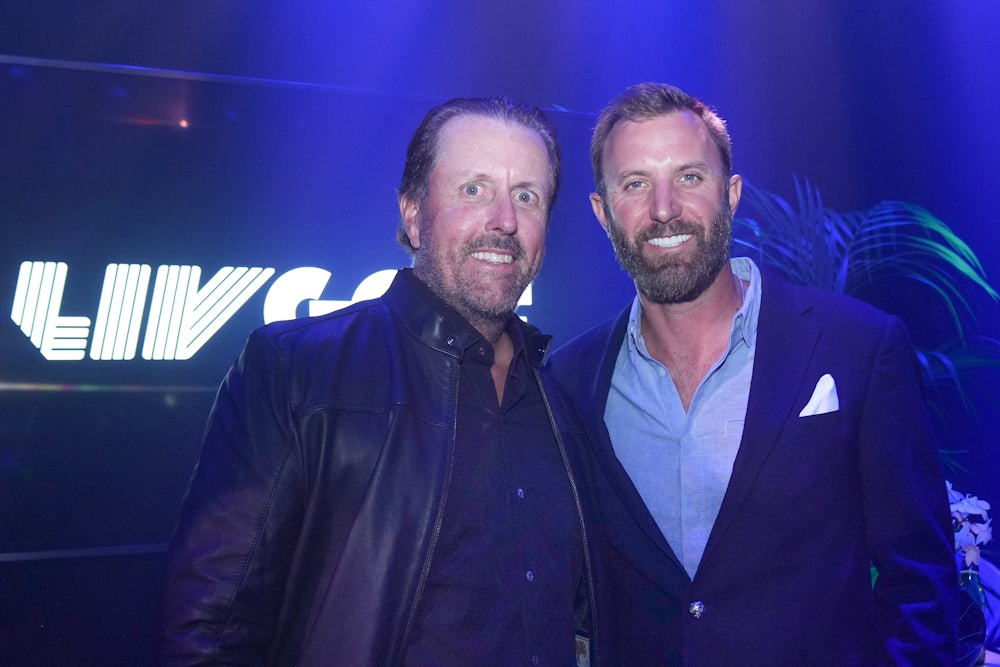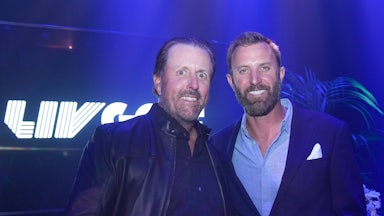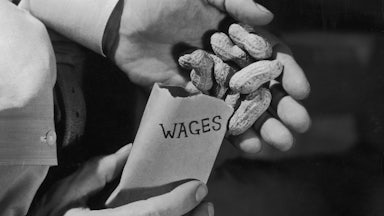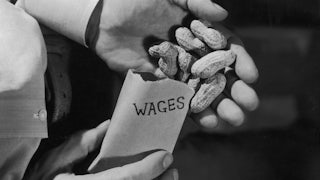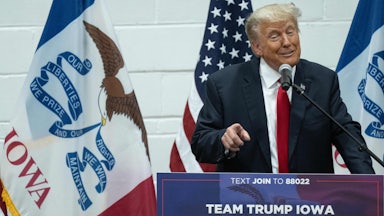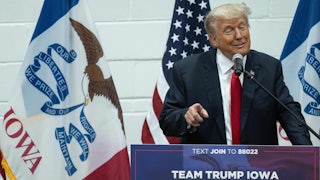Tuesday morning’s surprise merger between the PGA Tour and the insurgent, Saudi Arabia–backed LIV Golf is both completely insane and completely unsurprising. It is, above all else, the result of profound cynicism—which is ultimately what makes it unsurprising. And yet it is also insane because of just how cynical it is, even by the standards of professional golf, arguably the planet’s most cynical sport. The new combined entity essentially puts Saudi Arabia in charge of golf. Not the PGA—golf. The deal effectively combines the PGA, the European Tour, and LIV to form a new entity that people with close ties to the Saudi government will control.
A year ago, the PGA was making the case—correctly, if cynically—that the entire LIV project was illegitimate. Saudi Arabia was splashing huge sums of money around, wooing players like Phil Mickelson and Bubba Watson, and trying to build a glitzy competitor. A year ago, PGA commissioner Jay Monahan appealed to players to stay with his outfit, citing Saudi Arabia’s alleged complicity in the September 11 attacks. “I think you’d have to be living under a rock to not know there are significant implications,” Monahan said at a press conference. “Two families close to me lost loved ones. I would ask any player who has left or any player who would ever consider leaving, ‘Have you ever had to apologize for being a member of the PGA Tour?’” The message was simple: The PGA might be skimping its players, but at least it wasn’t (allegedly) complicit in 9/11.
In September, in filing a countersuit against LIV golf as part of the two organizations’ litigation storm, the PGA accused Saudi Arabia of offering its players “astronomical sums of money … to use the LIV Players and the game of golf to sportswash the recent history of Saudi atrocities.” Those atrocities included the brutal murder and dismemberment of Washington Post journalist Jamal Khashoggi and Saudi Arabia’s pivotal role in the yearslong blockade of Yemen, which resulted in mass starvation and death. As part of the suits and countersuits, Saudi Arabia itself acknowledged that its Public Investment Fund, or PIF, the vehicle it had been using to acquire sports teams, was in fact an arm of the state—a direct contradiction of claims it made while purchasing the English Premier League club Newcastle United.
It gets worse. While it publicly saber-rattled about morality, the PGA also worked to convince its biggest stars to stick with it—turning down humongous payouts in the process. (Mickelson received a reported $200 million from LIV.) But on Tuesday, it essentially folded the league into LIV: The PGA is basically just LIV now, with the PIF’s governor chairing the new golf conglomeration. Except the stars it convinced to stay out of loyalty—and to publicly back the league to the hilt—didn’t get paid. Monahan and his ilk will rake money in, however. The league, moreover, reportedly didn’t communicate with the players it had deployed as human shields while negotiating the merger. (Monahan is scheduled to meet with the players later Tuesday.)
“PGA Commissioner Jay Monahan co-opted the 9/11 community last year in the PGA’s unequivocal agreement that the Saudi LIV project was nothing more than sportswashing of Saudi Arabia’s reputation,” Terry Strada, national chair of 9/11 Families United, said in a statement Tuesday. “But now the PGA and Monahan appear to have become just more paid Saudi shills, taking billions of dollars to cleanse the Saudi reputation so that Americans and the world will forget how the Kingdom spent their billions of dollars before 9/11 to fund terrorism, spread their vitriolic hatred, and finance al Qaeda and the murder of our loved ones. Make no mistake—we will never forget.”
In the end, Saudi Arabia gets everything it wanted. It started LIV to take over global golf, and that’s what it is doing. Yasir Al-Rumayyan, the PIF governor turned chairman of the still-unnamed new golf cartel, is suddenly the sport’s most powerful figure—one who has close ties with Saudi Arabia’s authoritarian crown prince, Mohammed bin Salman, and also chairs both Newcastle United and Aramco. This is a profound coup for Saudi Arabia, which has invested heavily in sports as a means of salvaging its global reputation. In addition to golf and Newcastle United, its domestic league currently employs Cristiano Ronaldo—and there is a strong possibility that he will be joined by his primary rival, Lionel Messi, and former teammate Karim Benzema in the coming months.
It’s hard to imagine that they’ll stop here, either. The Saudi soccer league clearly aims to take its place among the European hierarchy, and there’s no reason to believe that it couldn’t. One could easily imagine Riyadh hosting the first Champions League final held outside of Europe—or even the Saudi Professional League being included as part of the Champions League in the not too distant future. The lesson of the LIV-PGA debacle is that these leagues will ultimately bend to whoever has the most money—and that is clearly Saudi Arabia.
It’s worth underlining why Saudi Arabia is doing this: Its global reputation is deservedly tarnished. It’s doing this because it has rightfully been criticized for its brutal foreign policy and for subjugating women, religious minorities, and LGBTQ people. It’s doing this because it sees sports as both a shield and a means of engagement with the rest of the world. Owning golf—which, again, Saudi Arabia effectively now does—forces the world to engage with the kingdom, whether it wants to or not. It’s a bloody tentacle, and once it’s there, it’s hard to dislodge.
Most of all, though, Saudi Arabia is doing it because it works. Saudi Arabia’s human rights record and the state’s clear involvement in the deal should have precluded it from buying Newcastle United last year. But the English Premier League welcomed it—with open arms—because, well, it had more money than anyone else. Newcastle fans dressed in Saudi garb and chanted, “We’re richer than you.” This year, the team finished fourth—meaning it will play in the Champions League next season—a story the press has largely treated as a kind of Cinderella story, given the team’s recent abjectness. There were few conversations about mass starvation or systematic misogyny or bone saws—just a celebration of a little club from England’s northeast doing well.
Saudi Arabia, like most of the world’s barbarous regimes, looked at the 2022 World Cup—held in Qatar, another repressive state—and saw a massive success. Yes, the country’s human rights record was put under the microscope. Yes, there were troubling stories about its vile and inhumane treatment of migrant workers. And yet the world showed up in Qatar—and Qatar ultimately benefited. Sportswashing works. That’s the lesson here. It’s going to get much worse.
